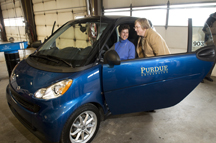
January 27, 2009
Smart cars now part of Purdue fleet
 |
Each Smart car is a two-seater coupe with a bit of storage behind the seats. The cars, which are known for very good fuel economy, strong safety ratings, and low price, will be used primarily for getting around the nearly 2,500-acre campus.
A number of Purdue officials gathered recently at the Transportation Service garage to see what the cars were like.
"The Smart cars provide a low-cost and fuel-efficient alternative to transportation needs on campus and are an extension of the University’s sustainability efforts," said James S. Almond, interim executive vice president for business and finance and treasurer.
Others attending the brief look-see included Robert E. McMains, vice president for physical facilities, and several officials in his area -- Joseph D. Mikesell, senior director of special projects and sustainability; John Gleason, senior director of administrative support and auxiliary services; Alan Leonard, director of service enterprises; Carol Cox, director of transportation services; and Robin Ridgway, director of sustainability and environmental stewardship.
Gleason said, "For now we expect to use them to get people [in Physical Facilities] to meetings or job sites. We're beginning to get more interest from departments around campus in long-term rentals."
For several years, Purdue's Transportation Service has been making fleet changes designed to promote sustainability -- adoption of biodiesel fuel, flex-fuel cars, ethanol blend fuel, and hybrid vehicles.
The current car fleet consists entirely of flex-fuel and hybrid units. By July 2012, the plan is to increase the fleet to 60 percent hybrid cars with 40 percent flex-fuel vehicles.
Smart cars were introduced in the United States in January 2008 and still get second looks because they have typical height but only 98.4 inches in length, producing an unusual shape.
At 1,600 pounds weight, they have a combined city/highway fuel rating of 36 mpg. Given typical use, Transportation Service projects a Smart Fortwo would save $510 per year in fuel costs compared with a flex-fuel Impala.
In U.S. safety tests on a five-star scale, the Fortwo got four-star and five-star ratings in impact tests.
Smart USA, which markets the vehicles, lists the coupe as starting at $13,990, far less than popular hybrids.
Begun in Europe in 1998 by Mercedes-Benz Cars and sold in at least 36 countries, Smart cars have found an eager buying public in the United States.
Leonard said, "They have a 19-month waiting list. We had placed ourselves on a list and when buyers didn’t follow through with their orders, we were given the opportunity to purchase these Smart cars."